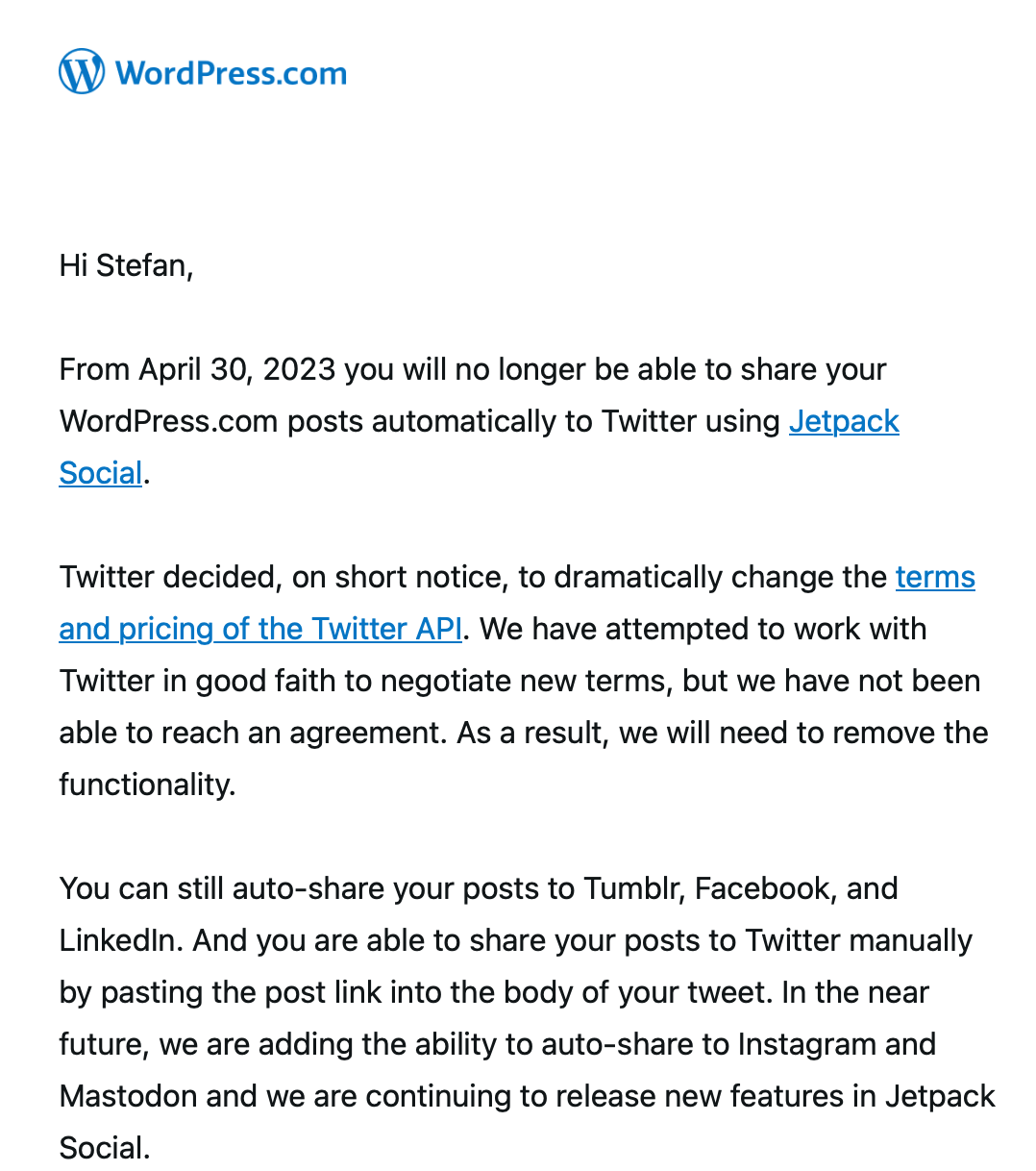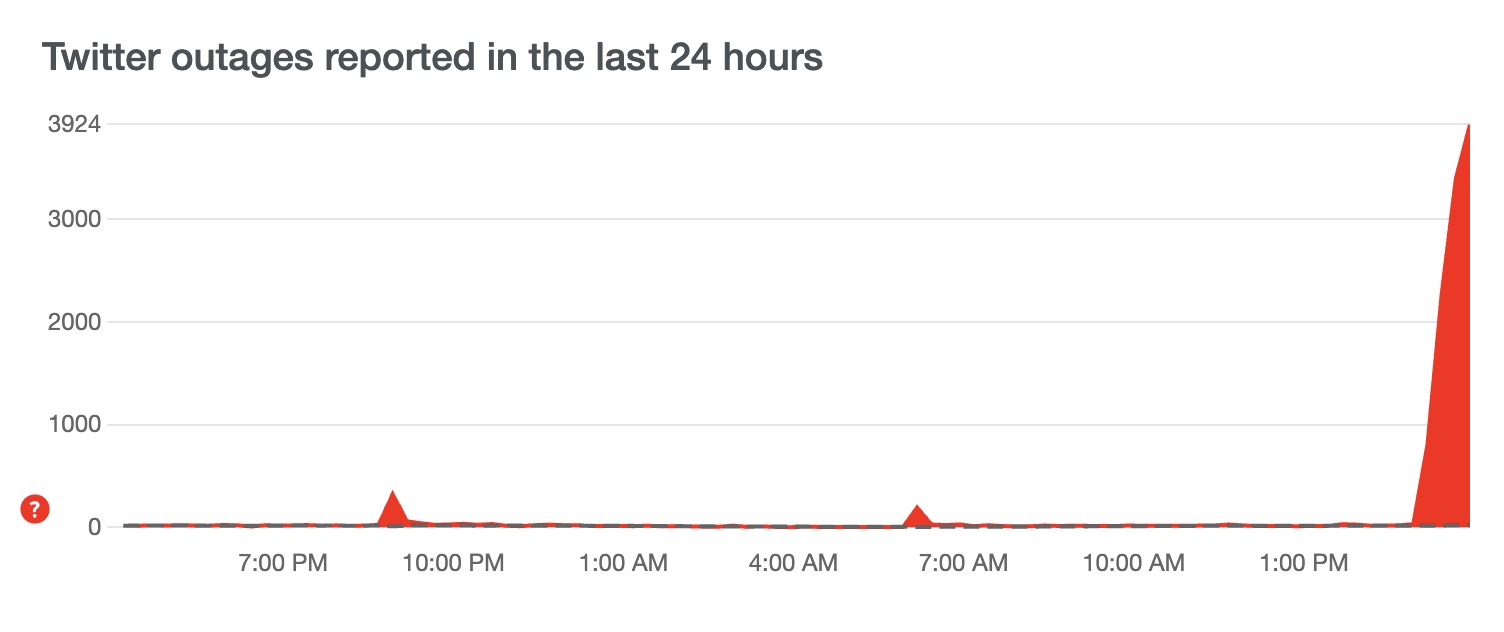You are using an out of date browser. It may not display this or other websites correctly.
You should upgrade or use an alternative browser.
You should upgrade or use an alternative browser.
General Elon Musk Fukkery Thread
- Thread starter Armchair Militant
- Start date
More options
Who Replied?

DigitalNaiv = Stefan Pfeiffer (@DigitalNaiv@mastodon.social)
Attached: 1 image From April 30, 2023 you will no longer be able to share your #WordPress.com posts automatically to #Twitter using Jetpack Social.

J. Martin (@gyokusai@mastodon.social)
Just to be clear here, WordPress currently powers half a billion websites; its estimated market share of known websites using CMS is over 60%; and its general share of the entire web is estimated to be at around 30–40% overall. #wordpress #twitter #fukkElon
It's amazing that how Elon can't stop himself from commenting on every single thing, I know it's a god complex, but it's like Twitter has literally fukked with his head that feels compelled to give answers to random shyt.
Also Today in Bug News.
Also Today in Bug News.
Apollo Kid
Veteran

Twitter Finally Deletes Pirated ‘Super Mario Bros.’ Movie After 9 Million People Watched It
Twitter has removed an account that posted the entirety of the box office hit 'Super Mario Bros,' but not before millions could watch the movie for free.

Twitter Finally Deletes Pirated ‘Super Mario Bros.’ Movie After 9 Million People Watched It
Twitter has removed an account that posted the entirety of the box office hit 'Super Mario Bros,' but not before millions could watch the movie for free.www.mediaite.com
Last thing Twitter/Elon needs is Nintendo on their case as well.
Elon Musk threatens to re-assign @NPR on Twitter to 'another company'
Updated May 2, 20239:22 PM ET
Bobby Allyn
Bobby Allyn

Twitter CEO Elon Musk speaks at the "Twitter 2.0: From Conversations to Partnerships," marketing conference in Miami Beach, Florida, in April.
CHANDAN KHANNA/AFP via Getty Images
Elon Musk has threatened to reassign NPR's Twitter account to "another company."
In a series of emails sent to this reporter, Musk said he would transfer the network's main account on Twitter, under the @NPR handle, to another organization or person. The idea shocked even longtime observers of Musk's spur-of-the-moment and erratic leadership style.
Handing over established accounts to third parties poses a serious risk of impersonation and could imperil a company's reputation, said social media experts.
"If this is a sign of things to come on Twitter, we might soon see even more of a rapid retreat by media organizations and other brands that don't think it's worth the risk," said Emily Bell, a professor at Columbia Journalism School who studies social media. "It's really an extraordinary threat to make."
Last month, NPR effectively quit Twitter after Musk applied a label to the news organization's account that falsely suggested it was state-controlled. Other public media organizations, including PBS and the Canadian Broadcasting Corporation, followed suit and stopped tweeting following similar labeling.
Musk has since removed the labels, but the outlets originally targeted have not resumed public activity on Twitter.
Musk: 'should we reassign @NPR to another company?'
In an unprompted Tuesday email, Musk wrote: "So is NPR going to start posting on Twitter again, or should we reassign @NPR to another company?"Under Twitter's terms of service, an account's inactivity is based on logging in, not tweeting. Those rules state that an account must be logged into at least every 30 days, and that "prolonged inactivity" can result in it being permanently removed.
Musk did not answer when asked whether he planned to change the platform's definition of inactivity and he declined to say what prompted his new questions about NPR's lack of participation on Twitter.
"Our policy is to recycle handles that are definitively dormant," Musk wrote in another email. "Same policy applies to all accounts. No special treatment for NPR."
The threat of retaliation is the latest volley in a months-long conflict between Musk and established media organizations since the billionaire purchased Twitter in October.
Musk has long attacked the media and attempted to undercut the credibility of journalists. The Twitter CEO has suspendedreporters who have published or promoted stories critical of him. Musk has stripped away, and at times reissued, "verified" blue check marks to news organizations and individual journalists.
By recently making "verified" blue checks available for purchase, Musk has created a turbulent social media landscape, blurring the lines for users between what is real and what is fake on one of the most influential social networks.
Musk to NPR: 'So what's the beef?'
His remark on Tuesday that he may transfer NPR's primary Twitter account with nearly 9 million followers to another entity is typical of how Musk has run the social media site.As is often the case with Musk, it is not clear whether he will follow through on the threat.
One former Twitter executive was taken aback by the remark, telling NPR that such a threat should be alarming to any business operating on the site, since it indicates that acquiescing to Musk's every whim may be necessary in order to avoid being impersonated.
For most of its 17-year history, Twitter has had rules that maintained a certain level of order and offered both individuals and organization some control over their presence on the platform.
NPR CEO John Lansing has previously said he lost faith with "decision-making at Twitter," and that more time is needed in order to determine if Twitter can be trusted again.
A spokeswoman for NPR declined to comment further.
Musk, whose statements to reporters are regularly laced with jokes, insults or attempts at trolling, responded sarcastically when asked who would potentially take over NPR's Twitter account.
"National Pumpkin Radio," Musk wrote, adding a fire emoji and a laughing emoji to describe the content of the fictional gourd-themed broadcaster. "NPR isn't tagged as government-funded anymore, so what's the beef?"
Disclosure: This story was reported and written by NPR Tech Reporter Bobby Allyn and edited by Business Editor Lisa Lambert. Under NPR's protocol for reporting on itself, no corporate official or news executive reviewed this story before it was posted publicly.">https://www.npr.org/2023/05/02/1173422311/elon-musk-npr-twitter-reassign
Last edited:

Twitter is randomly logging out users. You're welcome.
After TechCrunch reported earlier today that Twitter was experiencing a bug that was allowing people to edit their bios to briefly regain their Verified check marks, the Twitter website this afternoon has begun to forcefully log out users at random
Twitter is randomly logging out users. You’re welcome.
Sarah Perez@sarahintampa / 4:12 PM EDT•May 1, 2023Comment

Image Credits: TechCrunch
Twitter is not dead yet; it’s just randomly logging out a number of its users. After TechCrunch reported earlier today that Twitter was experiencing a bug that was allowing people to edit their bios to briefly regain their Verified check marks, the Twitter website this afternoon has begun to forcefully log out users at random. There are a number of complaints about the problem on Twitter itself, indicating that at least some are able to get back in after being booted from the site.
The issue appears to be impacting desktop users at this time who are using Twitter via the web. Some claim they’re being logged out repeatedly.
The issue occurs when you’re browsing the Twitter website, we found. The page refreshes and then Twitter users (including several of us here at TechCrunch) are taken to the default website for Logged Out users. This page shows a curated selection of tweets and options to sign in through Google or Apple or by creating a new account. Many people (tweeting via their phones, we guess) say they’re unable to get back into the site through any of the usual methods.
We’re facing that problem, too, having gotten to the screen where we can enter the code from a code generator app. But after the code is entered, the page only refreshes and returns us to the same Logged Out page once again.
The Downdetector website also shows a sharp increase in user complaints about the site, indicating the problem is fairly widespread.

Image Credits: Downdetector
Twitter has yet to acknowledge the problem via its official Twitter or Twitter Support accounts. A tech reporter at The New York Times, Ryan Mac, tweeted that the issue was caused by a bad front-end deployment, sources said.
The bug is yet another example of the growing slate of issues that have followed Elon Musk’s takeover of the social network and the significant layoffs of engineering staff that the transition entailed. Since then, Twitter has experienced a range of problems, including glitches with Twitter Circle that showed private tweets to the public, broken timelines, broken links and images, and misfired error messages, and it experienced multiple outages. At the same time, the company is pitching itself to advertisers and creators, and suggesting its future will involve becoming a super app that also offers payments.
Over the weekend, in fact, Musk even touted how media publishers — a group he recently alienated by dubbing outlets like NPR and PBS “government-funded” — would be able to offer micropayments for individual articles through Twitter. A similar concept is now being trialed by Twitter rival Post.
It’s not clear whether any of Twitter’s big plans will ever gain traction, however.
After all, it’s hard to sell much of anything on a website users can’t access.
88m3
Fast Money & Foreign Objects
Elon Musk threatens to reassign @NPR on Twitter to 'another company'
No company is going to trust this guy going forwards

bozo returned API access to the MTA as well
Elon Musk threatens to reassign @NPR on Twitter to 'another company'
No company is going to trust this guy going forwards
bozo returned API access to the MTA as well
If Mario takes this fool out and Mickey takes down Ron Desantis...Last thing Twitter/Elon needs is Nintendo on their case as well.
 millennial childhood icons showing up in the 11th hour to take out Boomer / Gen X neo-fascists would be
millennial childhood icons showing up in the 11th hour to take out Boomer / Gen X neo-fascists would be 
